Starting a website has never been easier if you choose to go with CMS (Content Management System) platforms. Two of the top-notch CMS platforms that stand out in the eCommerce market are Joomla vs WordPress.
So, how do you know which one is for you? In this article, LitExtension – #1 Shopping Cart Migration Expert will walk you through a detailed comparison between Joomla vs WordPress to help you determine which one wins this battle:
- An overview of Joomla vs WordPress
- Detailed comparison of these two CMS platforms
- Wise advice on what platform suits you the most
Not gonna let you wait any longer, let's get started!
Need Help To Migrate Your Store?
LitExtension provides a well-optimized All-in-One Migration Package to help you with all the complicated work. During the whole process (post, during, and after migration), you will have a Personal Assistant with you and give out ultimate support. What is more, you will enjoy all our Additional Options for free if choosing AIO Package!
Joomla vs WordPress: At A Glance
Launched in 2003, WordPress was first considered a blogging platform and has grown far beyond that. Currently, WordPress powers 32+ million websites—an impressive number that defeats all of its competitors (source: BuiltWith). This statistic shows how businesses favor this platform to some extent and, from then on, helps you make decisions easier.
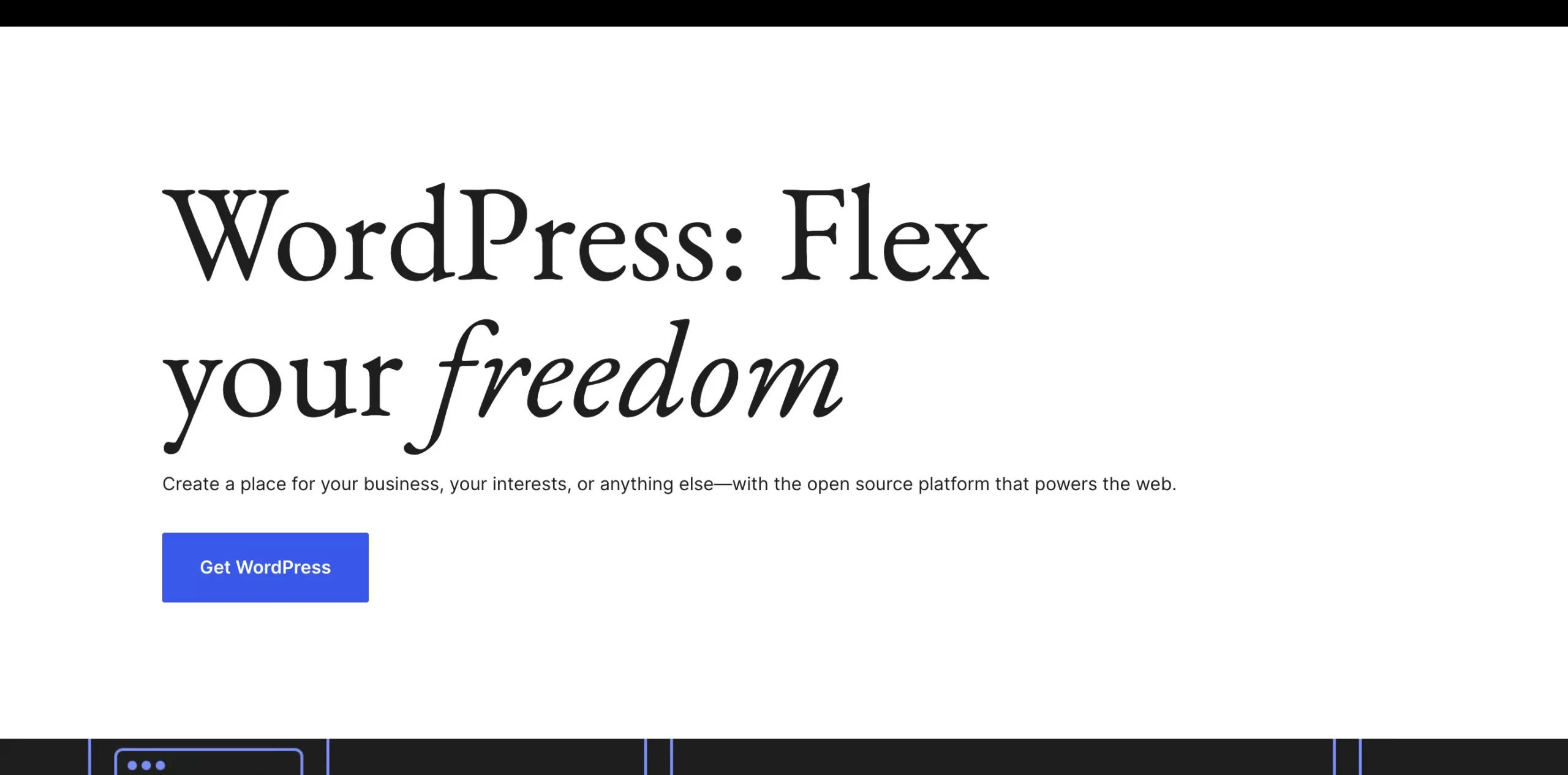
WordPress is separated into WordPress.com and WordPress.org:
- Hosted version WordPress.com: you just need to create an account, choose a plan, and build your website directly.
- Self-hosted CMS WordPress.org: you have full control of your website but you’ll need to download the software onto your computer and find your web hosting.
*Note: Within the scope of this article, WordPress will refer to the self-hosted CMS WordPress.org version.
Launched in 2005, Joomla is also a top open-source CMS platform written in PHP and stored in a MySQL database. As an open-source CMS, Joomla is free and available for everyone to use. It was launched to provide users with a scalable means of building their websites and applications, without any knowledge of coding.

Let's quickly look at the pros and cons of Joomla vs WordPress below:
Joomla | WordPress | |
Pros |
|
|
Cons |
|
|
Pricing
When starting an eCommerce business, any merchant focuses on saving as much money as possible, especially those on a low budget. Since Joomla or WordPress are open-source solutions, you have to consider the expense of the smallest details, such as web hosting, domain, security certifications, etc.
WordPress Pricing
Because WordPress is an open-source CMS, it’s free for you to download and install. Nevertheless, to have a website running properly, you still have to pay for a domain name, web hosting, and other expenses.
While doing the research on Joomla vs WordPress, we have estimated the price for your future reference. This might change based on your specific requirements while building the website:
- Domain: $10-$30/year
- WordPress hosting fee: $5 – $100+/month (varies based on type and provider)
- Security: from $50, monthly or one-time payment
- Developer fees: $40-$180+/hour
- Maintenance fee: From $99/month
- Plugins: $0 – $300 (monthly or one-time payment)
Depending on your needs, the cost to start a WordPress website can range from $100 to $500 to $3,000, to even as high as $30,000 or more. In return, you can launch a professional website with unlimited customization, a technical support team behind as well as full control of your site.
Furthermore, a WordPress development agency can help you determine the exact price of building your website in WordPress.
Joomla Pricing
Similar to WordPress, Joomla is also an open-source platform that is free and easy to use. You will also have to seek domain names, hosting providers, etc from third parties. The only difference lies in its price:
- Registering a domain: $10-$30/year
- Getting a hosting provider: $5 – $100+/month (varies based on type and provider)
- Design and development: $50-$200+/hour
- Maintenance: $100 – $1,000 monthly
- Plugins: Free to $300+ for complex plugins/subscriptions
In total, you may have to pay $700 – $6,500 monthly or higher to get a website from Joomla. It seems that the Joomla cost is more expensive than WordPress.
The verdict
WordPress has lower development costs thanks to its huge and dedicated community. Users can easily find help via a massive third-party ecosystem of blogs, forums, and developers. Meanwhile, Joomla websites still require a development fee.
Ease of Use
From our experience, ease of use is the first key factor when choosing an eCommerce platform.We all know that both Joomla vs WordPress are open-source platforms, meaning that they require a higher level of technical expertise to build your website compared to other hosted solutions.
Basically, you need to download and upload them to your web server. Both solution offers 2 methods to do so:
- One-click install with web hosting service: Many popular web hosts (like SiteGround, Bluehost, etc.) offer a one-click Joomla installation directly through their control panel.
- Manual download and installation: If your host doesn't have a one-click installer, you can download the WordPress or Joomla package and upload it to your web server.
Once installed, you'll have access to the backend (administrator panel), which is your website's control center. Now, let's see which is easier to use: WordPress or Joomla.
WordPress Ease of Use
WordPress is well-known for its ease of use, with many users opting for it over other CMS platforms. Its users are mostly beginners and tech-savvy individuals alike. WordPress is also easy to install and use. Its simple control panel enables most beginners to pick up the basics in no time at all.
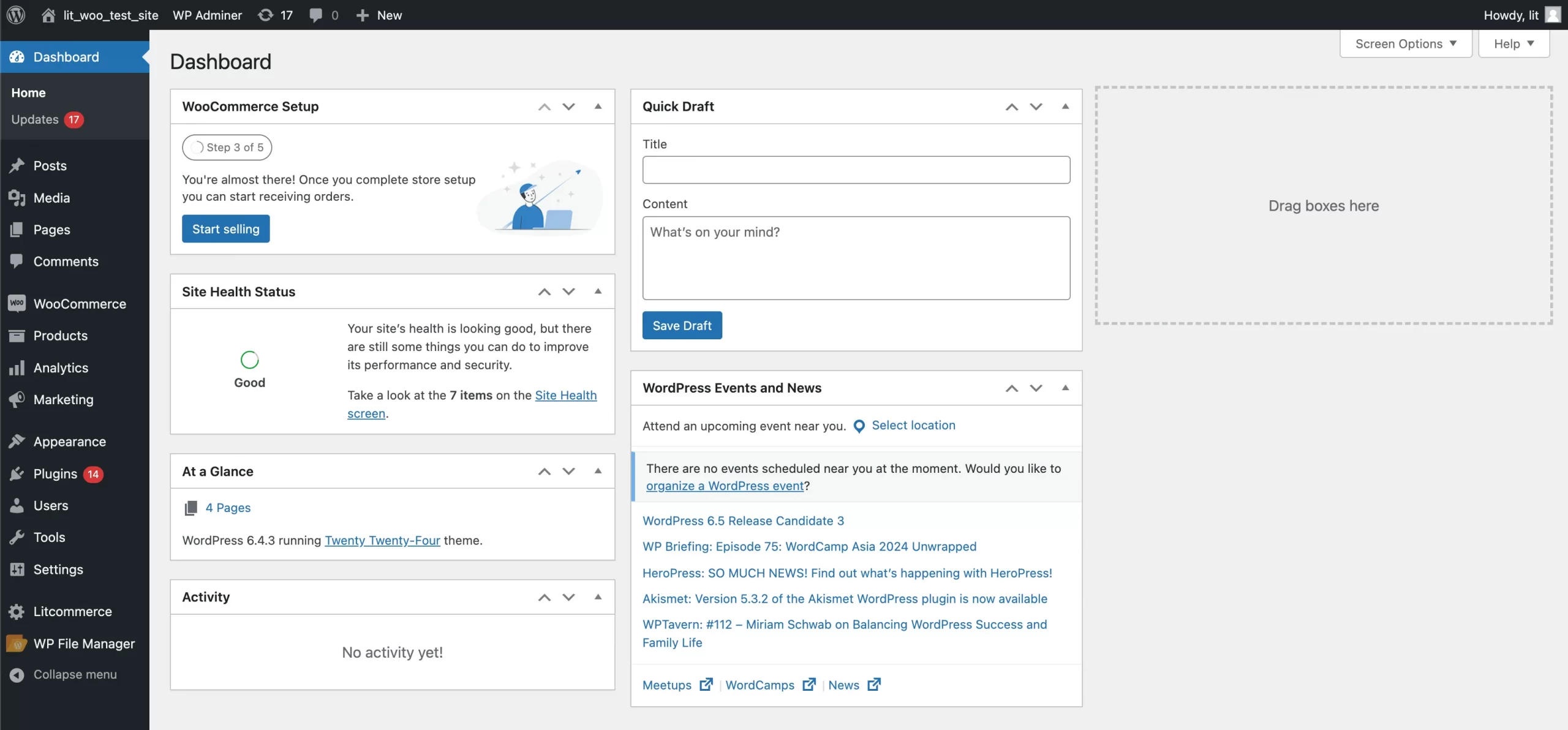
The back end is simple and clean, and everything within the dashboard is easy to use. Along the left side of the page are the various content areas of the site as well as the settings that can be manipulated. There’s absolutely no question as to where you can go to customize your design, set up social sharing, or add a new blog post.
Joomla Ease of Use
Joomla, on the other hand, is entirely different and may require more patience if you’re not familiar with technical terminology. If you take the time to learn around the ropes, this solution can prove a big asset to a company but it will take more effort and brain-power for beginners to get there than WordPress due to the sheer number of various admin screens.
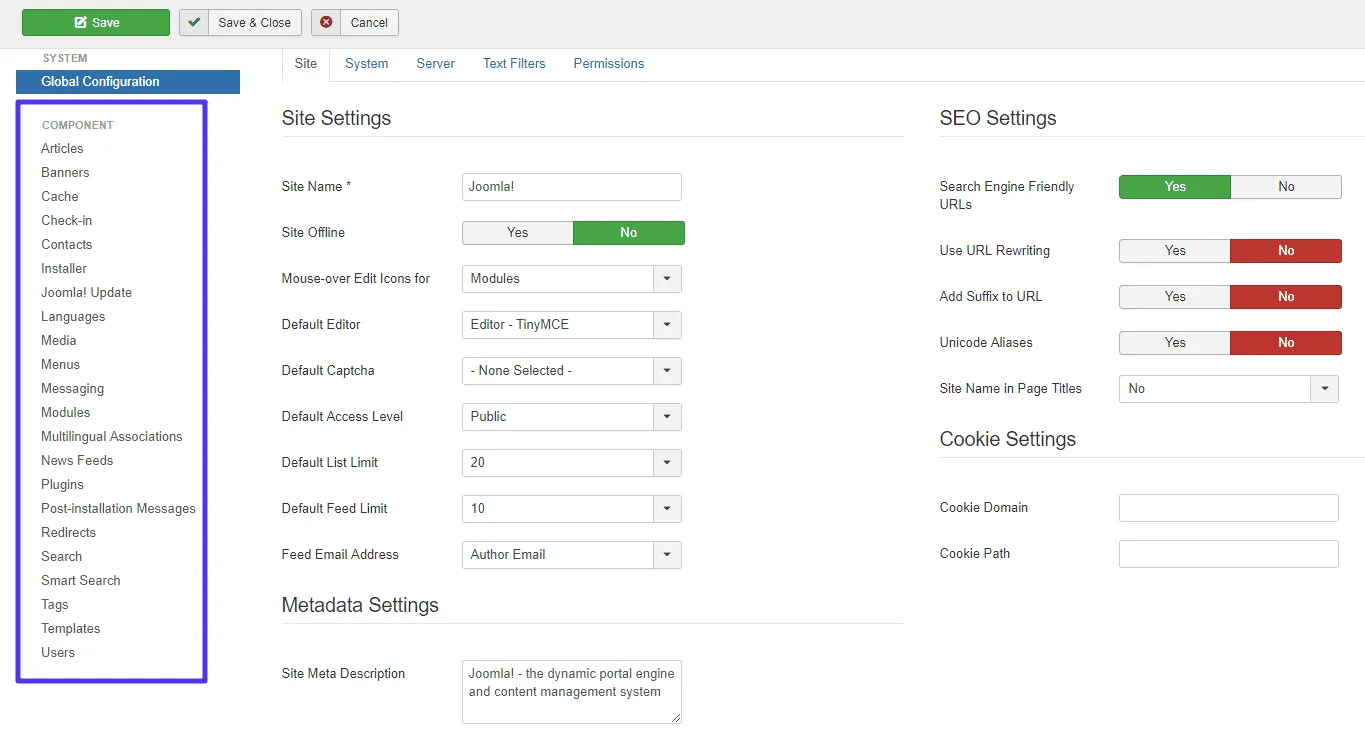
Joomla uses a combination of Articles and Categories. In other words, before creating content on Joomla, you need to create categories for the type of content you want to create. This process could be somehow more complicated than WordPress, especially for non-developers.
Ultimately, prioritizing ease of use enhances customer satisfaction, boosts conversion rates, and enables businesses to focus on growth and success.
The verdict
Our overall impression of this is that WordPress defeats Joomla when it comes to ease of use. Even though both Joomla vs WordPress have the same installation process, we still have to spend more time to entirely understand how Joomla's control panel works. Hence, this isn't quite a beginner-friendly solution.
Content Management
The essence of the internet lies in its content, and your website serves as a platform for showcasing that content. Hence, it's important to delve into how your content creation and publication experience will differ when using Joomla vs WordPress.
WordPress Content Management
WordPress offers a simple and intuitive content creation and editing experience. You can easily create, format, and publish posts and pages. The built-in visual editor (Gutenberg) makes it straightforward to add and arrange content elements. Not to mention creating a clear hierarchy for your blog section is its must-have advantage.
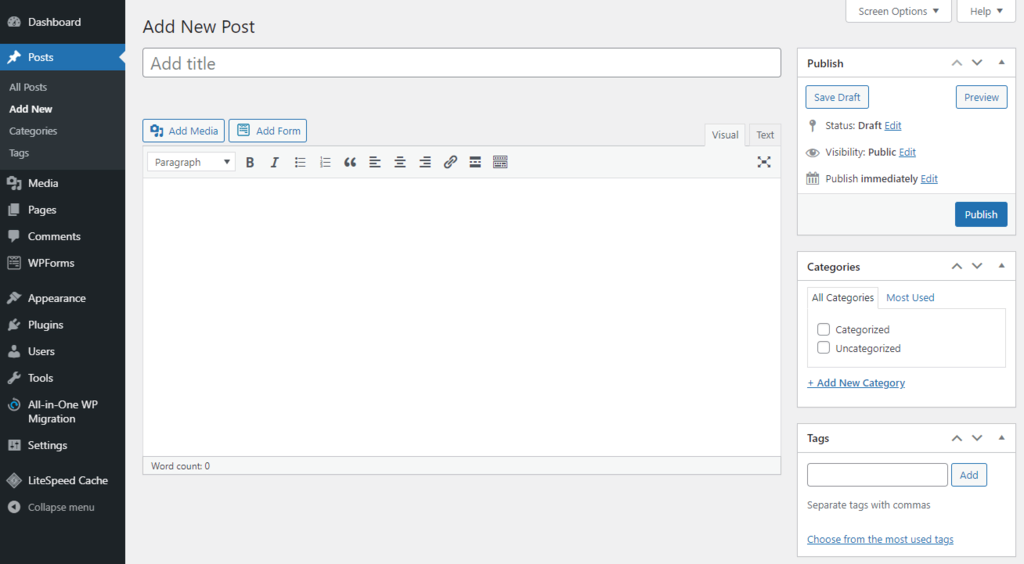
Every content needs media support, and WordPress just understands this at heart. The platform has robust media management capabilities, allowing users to easily upload, organize, and insert images, videos, and other media into their content.
Joomla Content Management
Joomla also provides a capable content editor, but it might not be as user-friendly as its competitor – WordPress. Similarly, you will be able to create articles and customize their content, but some of our members and customers find the interface less intuitive. This is also due to its more complicated structure for users to organize their content.
Nevertheless, Joomla offers more extensive version control with the ability to track changes in articles. This can be useful for collaboration and content auditing.
The verdict
It's needless to say that we love WordPress's content management features more than Joomla. The platform is considered more user-friendly and straightforward even for non-techies.
Joomla, on the other hand, offers a more complex and flexible content management structure, which can be advantageous for larger and more intricate websites but may have a steeper learning curve for beginners.
Design & Customization
One of the reasons WordPress and Joomla have become the most popular CMS is that they both allow users to extend their websites in different ways. That is to say, both of them offer various themes and plugins that users can easily add to their websites without knowing much about web development to create a functional website with an attractive appearance.
WordPress Customization
What we love about WordPress is its enormous number of themes (both free and premium)—12,000+ options that fit all types of websites. Plus, you can edit the source code so that the final storefront result matches your requirements. If you want drag-and-drop customization tools, feel free to install a plugin from its directory.

The only downside is that WordPress only allows merchants to install one theme for all web pages at a time.
Joomla Customization
On the other hand, though Joomla doesn't have an official template library, this does not stop users from creating the most visually appealing websites. You can find loads of templates available from third-party sources such as Themeforest or JoomShaper. The template may be edited via the Joomla editor, and the available customization options vary from template to template.
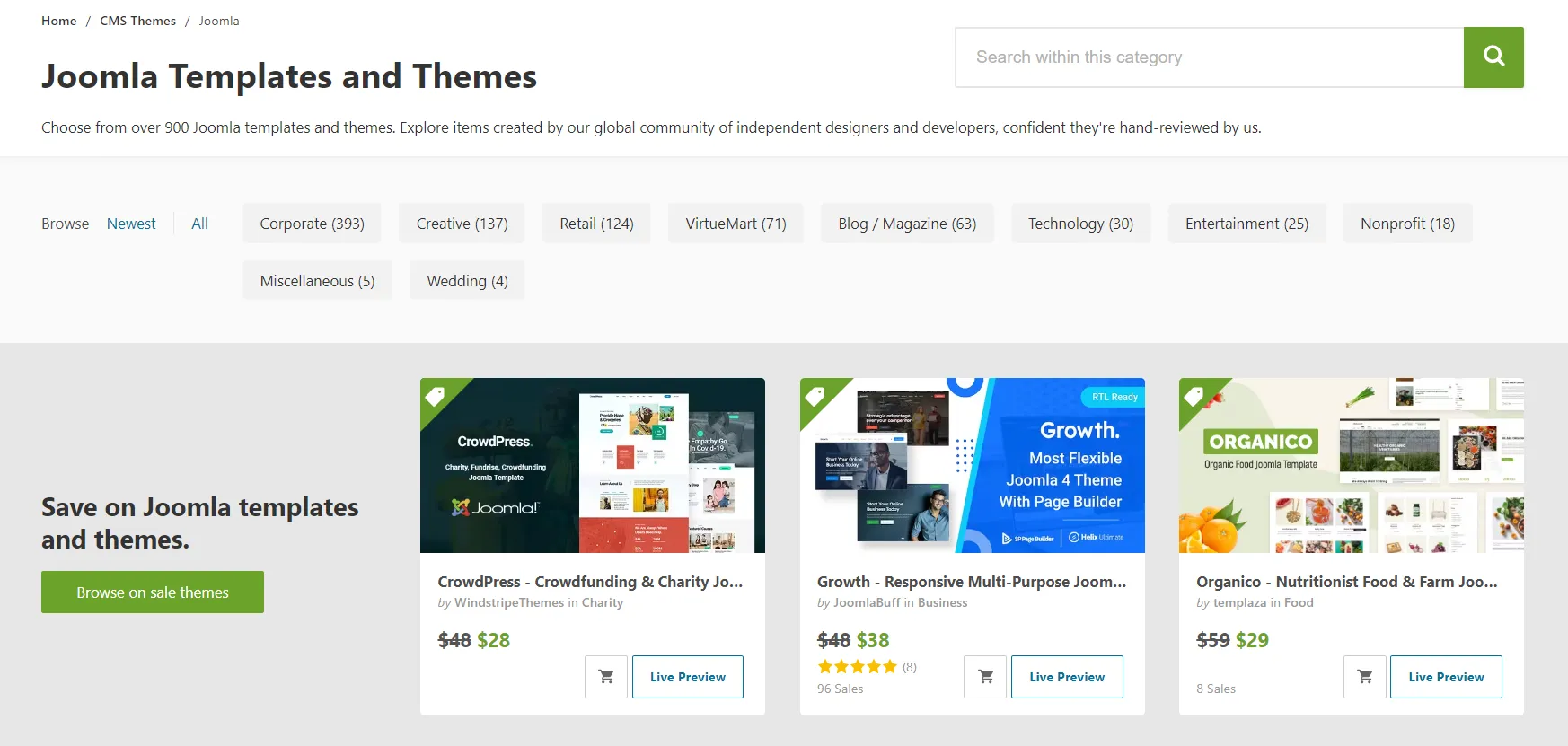
The competitive advantage of this solution lies in its ability to incorporate multiple themes across your website. To illustrate, Joomla customers can have different themes for different pages. You can switch up styles and templates if, for example, you want a different theme for your blog and your main website.
In addition, Joomla is more capable of handling multiple or more complex forms of content while WordPress can find it difficult to keep up.
The verdict
It's a tie when it comes to Joomla vs WordPress in terms of customization and design. Both have incomparable strengths that differentiate them from the rest.
Extensions & Plugins
Extensions and plugins are software components that integrate seamlessly with the website's platform, adding new features and extending its capabilities. They save time and effort by providing pre-built solutions for various tasks, such as SEO optimization, security enhancements, contact forms, social media integration, and more.
So, let's see how Joomla vs WordPress competes in the plugin aspect, comparing both quantity and quality.
WordPress Plugins
Similar to themes, WordPress also offers its users 59,000+ plugins to boost the website's performance. These will definitely adapt to any of your requirements, from creating a membership portal, online store, or school to even a photography portfolio. We must say, our website improved significantly thanks to these.

If you are using services provided by WordPress.com, you can even upload and customize your own plugins. However, this action is only available if you're on the Business or eCommerce plan, which goes for $25 and $45 a month, respectively.
Joomla Plugins
Joomla, however, only offers about 5,000+ official extensions on its website. Since its inception, Joomla has grown both in popularity and functionality, with passionate contributors adding to its selection of tools, extensions, and themes. Joomla extensions, conversely, are clearly separated by function, purpose, and scale:
- Components: These are standalone applications within Joomla and can handle complex tasks like eCommerce, forums, event management, etc. Some best extensions of Joomla could be mentioned: Virtue Mart, HikaShop, MijoShop, JoomShopping, J2Store, EShop…
- Modules: Modules are smaller extensions that display content or information on specific parts of your website, such as a login, menu, or weather module.
- Plugins: Plugins are pieces of code that trigger specific actions when certain events occur on your website. They can modify the way content is displayed, add social media integration, and extend other functionalities.
- Extension-Specific: These extensions are typically installed using either the Joomla Extension Installer or a third-party's dedicated installer.
However, unlike WordPress, Joomla requires more work to install an extension. This is due to the fact that the extension directory cannot be accessed straight from the control panel. After obtaining the extension from the repository, users must manually upload it to the installation page.
The verdict
WordPress seems to be the winner in this Joomla vs WordPress plugins battle. Since Joomla is less common than WordPress, the quantity and quality of extensions are not as enhanced as its competitor.
Is WordPress the platform you're looking for?
LitExtension provides a well-optimized WordPress Migration service that will help you transfer all your data accurately, and painlessly with utmost security.
SEO & Marketing Features
Needless to say in the continuously evolving world of technology to run a business, your site should be on the top 10 list in most of the search engines. Therefore, SEO is one of the most important factors to consider when choosing a platform for your business. Let's dig deeper into this Joomla vs WordPress comparison for the business site for SEO.
WordPress SEO
WordPress is a great platform when it comes to considering SEO. Many themes contain SEO features like schema markup, breadcrumb navigation, open graph data, and so on. WordPress also allows you to create tags for posts, something that Joomla doesn’t allow without the use of an extension. Besides, you can optimize permalink structures and set all the appropriate metadata for pages and posts.
You should consider using WordPress's most powerful SEO plugin, Yoast SEO. It offers lots of features, and anyone can learn it in a couple of minutes. Yoast categorizes your SEO score in different areas using a traffic light system of red, yellow, or green colors.
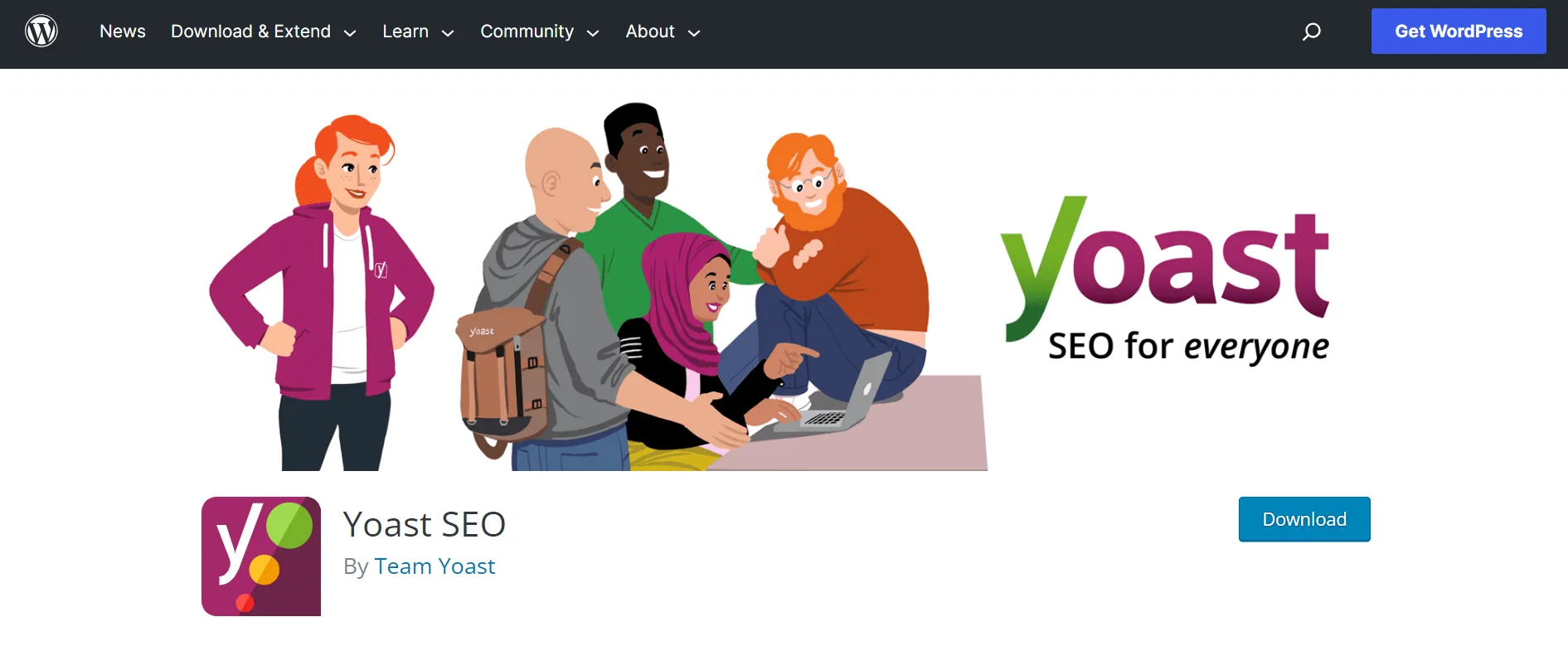
Furthermore, the plugin tells you exactly how to improve your score in each area and also rates your post’s readability so that you can optimize your content as much as possible. The good news is that with WordPress, it is quite possible to get a high ranking even though you’re new to the website game, and you can easily have great control over SEO.
Speaking of marketing, WordPress really simplifies it. It easily connects to social media, so you can link each of your company’s social media accounts to your sites. Plus, its Analytics and Tracking features tell you how many people have visited your site and their frequency. WordPress offers these numbers freely and easily.
Joomla SEO
On the other hand, Joomla is also an SEO-friendly platform. Although it requires the most initial care and attention in terms of SEO, it has great potential to rank very high if you set up the website properly. In Joomla, you can enable Search Engine-friendly URLs, making them more readable and memorable for both humans and search engine crawlers. Furthermore, it also enables URL rewriting that helps you get rid of index.php in your URL. Besides, it is possible to add metadata and title tags to your page.
However, Joomla's proper on-site optimization is not a one-click affair, especially for newbies and first-time users, so make sure to get an expert with you when optimizing website SEO.
The verdict
Speaking of SEO between Joomla vs WordPress, it's a tie!
Joomla supports basic SEO functionality, but it's best to be technically savvy to optimize website SEO. Just like Joomla, WordPress equips its users with basic SEO features, and you can always use SEO plugins like Yoast SEO for more advanced attributes.
Payment Gateways
When it comes to website development, selecting the right payment gateway is crucial for seamless online transactions. Both Joomla vs WordPress offer various solutions for accepting payments, but they differ in terms of ease of integration, flexibility, and the range of payment processors they support.
WordPress WooCommerce Payment Gateways
WooCommerce is the most popular eCommerce plugin for WordPress. This platform also has over 100 payment gateways to help you process and sync your payment easily, including some well-known ones: Paypal, Amazon Pay, Stripe, eWay, etc.
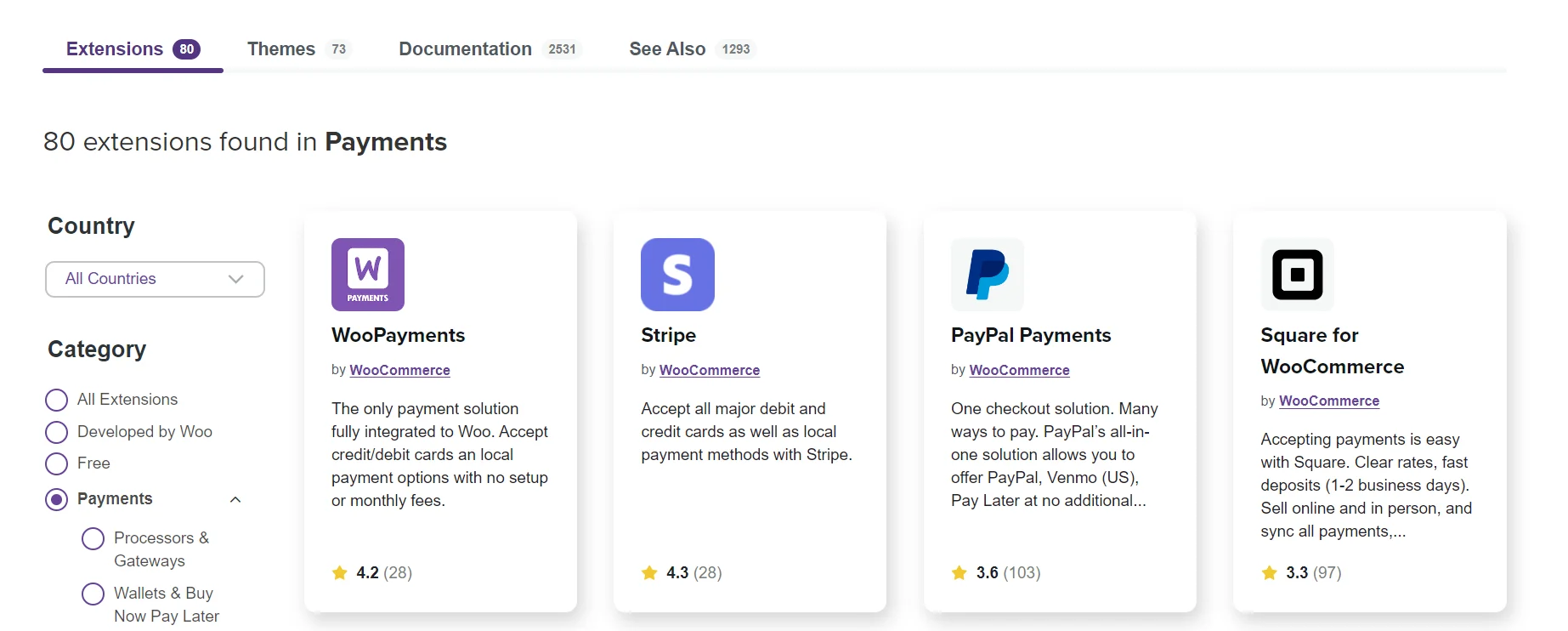
Joomla Payment Gateways
Joomla offers 77 payment gateways, including free and paid extensions that allow you to take any type of payment. You can check here for the list of Joomla payment gateways.
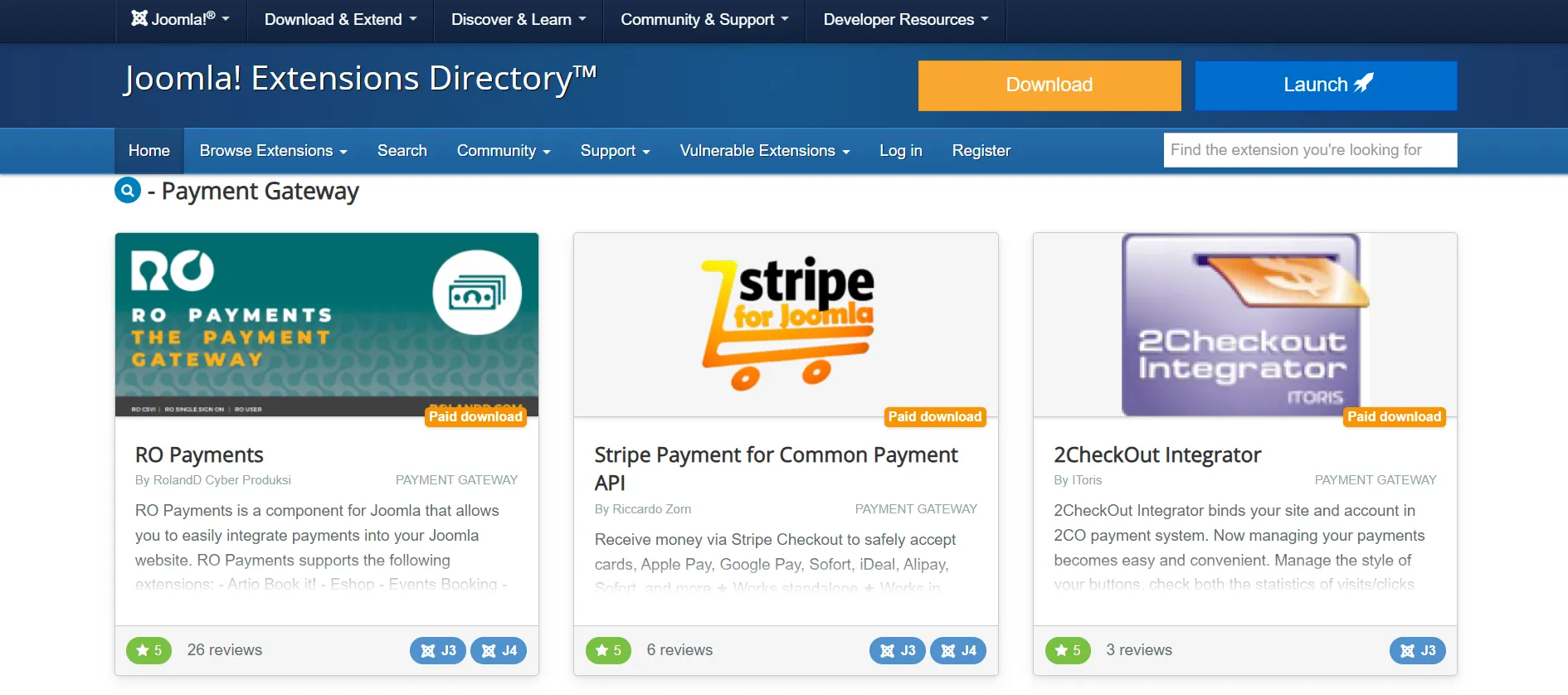
The verdict
WordPress beats Joomla by offering over 100 payment options, while Joomla provides 77 payment gateways.
Security
It's a must for any online merchant to be aware of the platform's security before choosing one. None of us wants to lose our precious data to hackers. This not only damages our customers' shopping experience but also causes a drop in sales. So, how does Joomla vs WordPress differ in terms of security?
WordPress Security
Due to their widespread usage, hackers often target WordPress websites for data breaches, hacking attempts, malware, and Trojan attacks.
Although WordPress offers thousands of plugins and extensions, it’s impossible to make sure that every plugin employs proper safety standards and remains compatible with newer versions of the platform. This can be a nightmare from a security standpoint. Furthermore, most of its advanced extensions rely mainly on plugins, and you have to modify its core file to enable an SSL connection.
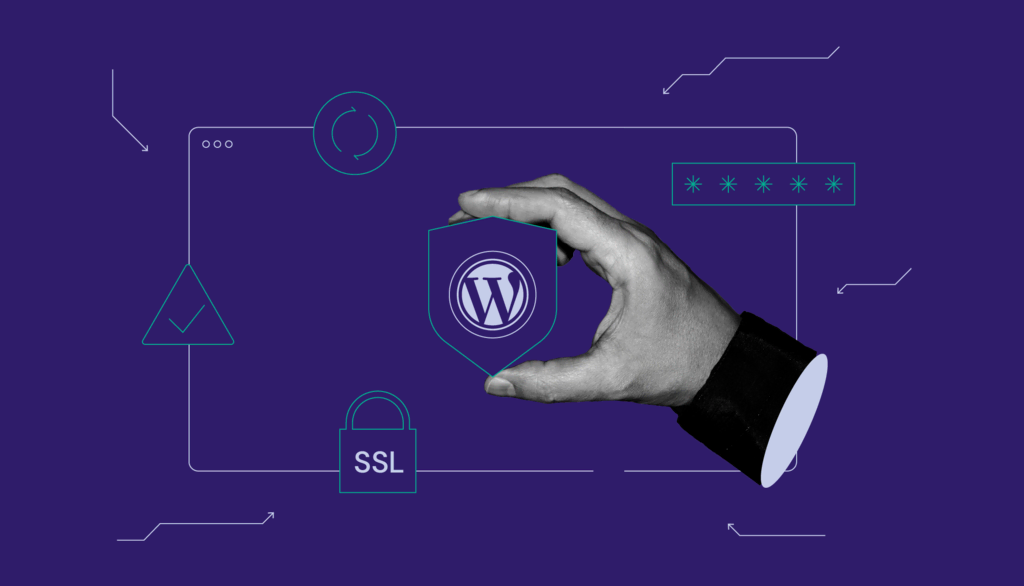
But don’t worry yet, WordPress has already offered its own set of security extensions and plugins to help users secure their website at the highest level. Specifically, more and more WordPress users are now installing the SSL certificate, which initiates a secure session with browsers. You will need to purchase the SSL certificate from third-party vendors before starting the installation process.
When your SSL is ready, you will be able to install it for your sites with supporting options from these platforms. The most popular WordPress plugin for supporting installing SSL Certificates is Really Simple SSL, which will automatically detect your settings and configure your website to run over HTTP.
The good news is that WordPress has a regular update cycle with security fixes, performance enhancements, and, of course, new attributes. If you’re a WordPress user hoping to make the most of the system, you need to carry out the WordPress update regularly.
Joomla Security
Similar to WordPress, Joomla security also faces some risks arising from extra Joomla extensions and plugins, which make up 84% of all hacked sites in the system. Understanding that no CMS is 100% secure, this solution also offers a set of security extensions and plugins.
While WordPress requires extra plugins to set up SSL, Joomla has its “Joomla Force SSL”, which allows users to activate the Joomla SSL Certificate in their core system without installing any extra extension.
Also, you've got to be aware that each new version of Joomla will be supported by the Joomla team for only a limited amount of time. Thus, you need to perform Joomla update on a regular basis to ensure it is running on the most current and bug-free version.
The verdict
Joomla wins! Due to the nature of open-source solutions, both Joomla vs WordPress require users to take responsibility for security-related tasks. The main difference is that Joomla has its own Joomla Force SSL meaning there's no need to install extra plugins, while an extra plugin to set up SSL is compulsory if you're using WordPress.
Help & Support
Last but not least, we've come to the help center of both WordPress vs Joomla. If you are a newcomer, this is more than an important factor to consider since you will have a lot to ask when building your website.
WordPress Support
Being the most well-known CMS, WordPress has built a very strong active forum for enormous users. You’ll find a wealth of advice and tutorials on WordPress-related topics throughout the web. In the same way, you can also come across multiple texts and video manuals, guidelines, and tutorials compiled by other system users.
Apart from the free support function, you can hire WordPress experts all around the world as well (with more technical and complex issues that you cannot solve by yourself).
Joomla Support
Similarly, Joomla is a free CMS and has an online collaborative community for its users, developers, or anyone interested in learning more about Joomla. Plus, the official website offers a huge range of support in the form of tutorials, guide articles, and videos, which are free, helpful, and easy to find.
The verdict
It's a tie when it comes to the battle of Joomla WordPress support. Both WordPress and Joomla have various resources to help users address issues while using the two platforms.
WordPress or Joomla: Which Should You Choose?
At the end of this WordPress Joomla battle, WordPress is ahead of the game according to some criteria we have just gone through. To decide which CMS is the best to use, you need to consider your website’s purpose.
It’s not surprising that WordPress is the best CMS for beginners, especially non-IT users, and ideal for blogging. If you are new to web-building and want to get a site up and running as quickly as possible, then you should go with WordPress.
Joomla is a more flexible platform for displaying different types of content and managing users. If you are technically savvy and are looking for a more flexible CMS that allows you greater creativity in your design, then Joomla could be your go-to option.
Besides Joomla vs WordPress, Drupal is also a brilliant CMS. Take a look at our head-to-head Drupal vs WordPress comparison before deciding between Joomla vs WordPress vs Drupal.
Bonus reading:
Joomla vs WordPress: FAQs
Is WordPress better than Joomla?
WordPress is often considered a better choice for beginners and users looking for a user-friendly, versatile platform with a vast selection of themes and plugins.
Joomla, on the other hand, offers a more complex but powerful content management system suitable for larger and more intricate websites. The choice between the two depends on your specific needs and familiarity with the platforms.
Does anyone still use Joomla?
Yes, Joomla has a sizable, active community. Though less popular than WordPress, it's reliable for various websites.
What are the disadvantages of Joomla?
Joomla is a platform that requires more effort to learn, as there are fewer readily available resources. Additionally, custom development may be slightly more expensive.
What is Joomla best used for?
Joomla shines for websites needing extensive customization and complex features. Its granular user management system makes it ideal for intricate membership sites or corporate intranets, and its flexibility allows for custom content structures perfect for data-heavy projects.
Conclusion
Hopefully, by reading this article, you have identified some key differences between Joomla vs WordPress to determine which one is best suitable for your website.
If you find your existing website no longer compatible with online business and wish to migrate from Joomla to WordPress or vice versa, feel free to contact LitExtension for more insightful information.
You might gain more eCommerce tips & tricks in our LitExtension blog or join Facebook community group.

